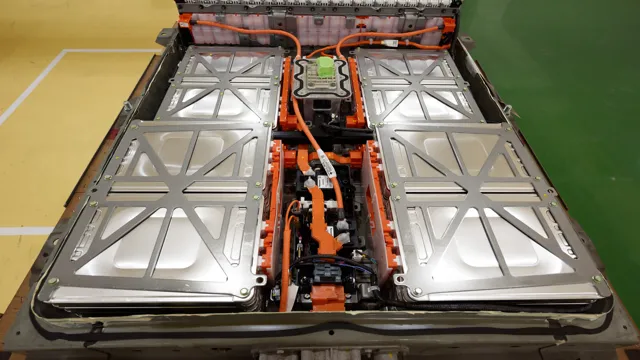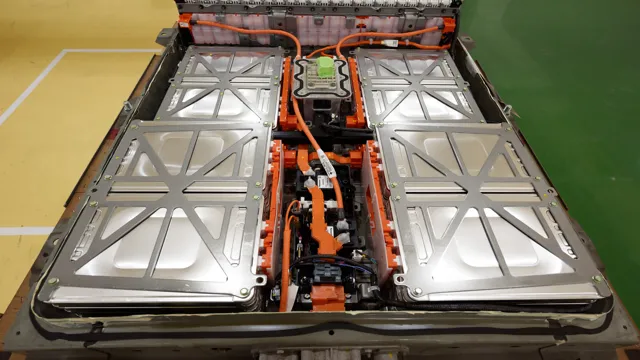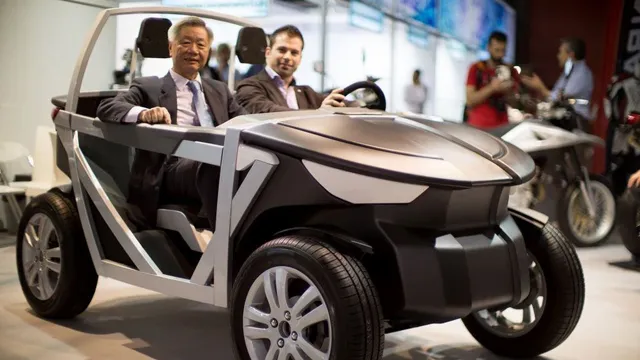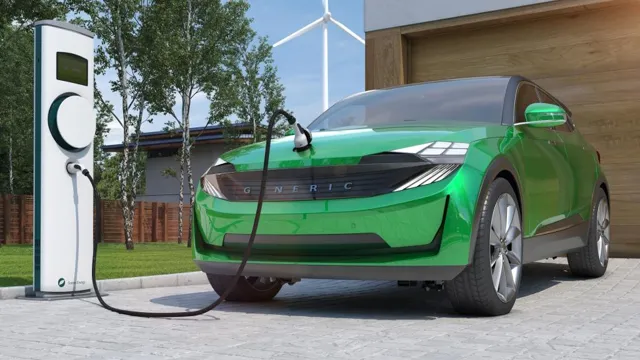Driving Towards a Greener Future: How Electric Car Batteries are Reducing CO2 Emissions
Electric cars have been touted as one of the best solutions to curb greenhouse gas emissions and address climate change. However, there is a common misconception that driving an electric vehicle is entirely emission-free. Electric cars rely on batteries to store and release energy, which raises the question of whether the production and disposal of batteries lead to significant CO2 emissions that offset any potential benefits.
In this blog post, we’ll delve into the topic of electric car battery CO2 emissions, discuss the factors that impact their emissions, and assess their environmental impact. Whether you’re an EV owner or contemplating purchasing one, this blog post is a must-read.
Understanding CO2 Emissions from Electric Car Batteries
When it comes to electric cars, it’s easy to assume that they’re a clean and sustainable alternative to traditional gasoline vehicles. However, the truth is more complex. While electric cars generate zero tailpipe emissions, their batteries have a significant carbon footprint.
The manufacture and disposal of electric car batteries emit carbon dioxide or CO This is primarily due to the energy used in the production process and the materials required, such as metals like lithium, cobalt, and nickel. Nevertheless, despite the initial carbon footprint, electric vehicles still produce fewer emissions over their entire lifetime compared to traditional cars, provided the electricity used to power them comes from a sustainable source such as solar or wind energy.
This is why it’s essential to consider the carbon footprint of not just the car but the entire supply chain when assessing the environmental impact of electric vehicles.
CO2 Emissions During Battery Production
Electric car batteries have been praised for being a cleaner alternative to fossil fuels, but the production process itself still generates CO2 emissions. Batteries are made using a mix of metals, which require a lot of energy and resources to extract and process. The mining and transportation of these metals alone contribute to the production of CO2 emissions.
When the metals are combined to form the battery, a high amount of energy is required as well. It is estimated that the production of an average electric vehicle battery generates around 74-150kg of CO2, depending on the size and type of battery. However, it is important to note that these emissions are generally offset by the lower emissions generated during the car’s usage.
Overall, the CO2 emissions generated during battery production are concerning, but it is still a cleaner option when compared to traditional fossil fuel vehicles.
CO2 Emissions During Battery Use
CO2 Emissions During Battery Use When it comes to electric cars, the question often asked is whether they emit CO2 during battery use. The answer is not a straightforward yes or no. While electric cars themselves emit zero emissions, the production and disposal of their batteries do generate CO
The carbon footprint of an electric car is heavily dependent on the source of electricity used to charge the batteries. If the electricity generated comes from renewable sources such as wind, solar or hydroelectric, the carbon footprint is low. However, if the electricity generated comes from burning fossil fuels such as coal or natural gas, the carbon footprint is high.
It is important to note that the carbon footprint of an electric car reduces over time, as the battery technology and manufacturing process evolves to become more efficient and eco-friendly. At present, electric cars have a lower overall carbon footprint compared to traditional gasoline-powered cars.
Comparing Electric and Gasoline Vehicles’ CO2 Emissions
When it comes to reducing carbon emissions, switching to an electric car seems like an obvious choice. But, how much CO2 does an electric car battery produce compared to a gasoline car? It’s a question that has been debated for quite some time now. However, studies have shown that electric cars produce less or even zero direct emissions, while gasoline cars emit a significant amount of CO2 during their operation.
This makes electric cars a better choice if you want to reduce your carbon footprint. While it is true that the production of electric car batteries requires some CO2 emission, it is still far less than the amount that would be created while driving a gasoline car. Moreover, the production of electric car batteries has become more sustainable and eco-friendly over the years, resulting in lower greenhouse gas emissions.
Thus, electric cars seem like a viable option for those who want to contribute to the fight against climate change and reduce their carbon footprint.
CO2 Emissions per Mile Driven
When it comes to cutting down emissions, electric vehicles have become a popular choice over the years due to their lower carbon footprint. A typical gas-powered car releases around 411 grams of CO2 per mile traveled, while an electric vehicle produces about 125 grams per mile. This is primarily because electric cars use batteries instead of gasoline, and they do not emit tailpipe emissions.
However, it is essential to consider that charging an electric car’s battery is still reliant on the power grid, which may still operate on fossil fuels. This means that the total carbon emissions of an electric vehicle depend on the energy mix used to generate its electricity. If renewable energy sources generate the electricity, the emissions from an electric car would be extremely low, if not zero.
As we work to reduce carbon emissions, electric vehicles serve as a viable solution that should be part of our sustainable future.
CO2 Emissions over the Lifetime of the Vehicle
CO2 emissions, electric vehicles, gasoline vehicles, lifetime, comparison When it comes to CO2 emissions, electric vehicles have a clear advantage over gasoline vehicles during their lifetime. While gasoline vehicles emit CO2 throughout their lifetime, electric vehicles emit no CO2 during their operation. However, it’s important to note that the CO2 emissions from electric vehicles are not totally eliminated as they still depend on the electricity grid.
The amount of CO2 emissions from an electric vehicle, therefore, depends on the source of the electricity used to charge it. If the electricity is generated from renewable sources, then the emissions are significantly lower than for gasoline vehicles. On the other hand, if the electricity is generated from fossil fuels, then the emissions from an electric vehicle can be higher than that of a gasoline vehicle.
Nonetheless, with the increasing availability of renewable energy, electric vehicles are becoming a more sustainable option. Overall, when comparing the lifetime CO2 emissions of electric and gasoline vehicles, electric vehicles have the potential to significantly reduce emissions and make a positive impact on the environment.
CO2 Emissions in Different Countries
When it comes to CO2 emissions, there’s a clear difference between electric and gasoline vehicles. In countries where electricity is generated using primarily coal, electric vehicles may not be the best choice for reducing emissions. However, in countries like Norway, where electricity is mainly produced from hydropower, electric vehicles have significantly lower emissions than their gasoline counterparts.
It’s essential to consider the source of electricity when comparing different types of vehicles. Moreover, we should take note of the variety of cars produced in different countries. For instance, in Japan, most of the cars are hybrids or electric, which suggests that the country is way ahead in decreasing emissions in the automobile sector compared to countries where most vehicles run on gasoline.
In China and the United States, gas-powered vehicles still make up the majority of the automobile market. Therefore, we should recognize that electric cars would have a far more significant impact in reducing CO2 emissions in regions with cleaner power sources.
Reducing CO2 Emissions from Electric Car Batteries
Electric car battery CO2 emissions are a rising concern for environmentalists. While electric cars have been touted as a way to reduce emissions, the production of their batteries often creates a significant amount of carbon dioxide. To mitigate this issue, efforts are being made to improve battery manufacturing techniques and use cleaner energy sources.
Recycling and reusing batteries can also reduce emissions as it reduces the need for new batteries to be produced. Additionally, some car manufacturers are exploring the use of alternative materials, such as solid-state batteries, that have a lower environmental impact. As the popularity of electric cars continues to grow, reducing CO2 emissions from the manufacturing and disposal of their batteries will be crucial for their role in the fight against climate change.
Improving Battery Manufacturing Processes
Electric car batteries are an important component of the push towards reducing carbon emissions, but the manufacturing process can itself create a significant amount of CO To reduce this impact, manufacturers are exploring new methods to create batteries that are greener from start to finish. For instance, some companies are exploring the use of recycled materials or sustainable sourcing to reduce the carbon expense of sourcing raw materials.
Additionally, reducing the amount of energy required to create batteries is a key focus, with the potential to decrease manufacturing-related emissions. Finally, designing batteries for easier recycling, after their useful life, can reduce the amount of waste and unprocessed materials left at the end-of-life. Altogether, these strategies are vital to limit greenhouse gas emissions from battery production, and to continue the move towards more sustainable transportation options.
Incentivizing Low-Carbon Materials
Electric car batteries play a crucial role in reducing carbon emissions from transportation. However, the production of these batteries has a high environmental cost due to the extraction of raw materials such as lithium, nickel, and cobalt. To mitigate the environmental impact of producing electric car batteries, manufacturers are incentivizing the use of low-carbon materials.
One such material is recycled nickel and cobalt, which can reduce carbon emissions by up to 90%. By utilizing recycled materials, manufacturers can reduce the carbon footprint of their products while also lowering their production costs. Another way to incentivize the use of low-carbon materials is through government policies and regulations, such as tax incentives and carbon pricing.
This encourages manufacturers to invest in sustainable materials and technologies, ultimately leading to a more sustainable and green future. In conclusion, by incentivizing the use of low-carbon materials in the production of electric car batteries, we can reduce the environmental impact of transportation and move towards a more sustainable future.
Final Thoughts on Electric Car Battery CO2 Emissions
Electric car battery CO2 emissions have been a major point of discussion amongst car companies and environmentalists alike. It is true that the production of electric car batteries does emit CO2, but it is important to note that the emissions from production are quickly offset by the lack of emissions during the use of the car. In fact, a 2015 study conducted by the Union of Concerned Scientists found that an electric car in the US produces less emissions than a gas-powered car, even when factoring in the emissions from battery production.
Furthermore, as the production of electric car batteries becomes more efficient and less carbon-intensive, the emissions from production will continue to decrease. Overall, while electric car battery CO2 emissions should not be ignored, they should not overshadow the many benefits that come with driving an electric car.
Conclusion
In conclusion, while the electric car may seem like the shining savior of sustainable transportation, it is not without its own set of emissions challenges. While the battery may not produce any direct CO2 emissions during its operation, the production and disposal processes must be taken into account. As with any technology or solution, it’s important to consider the entire lifecycle impact and strive for a balance of sustainability and practicality.
So, let’s keep pushing for cleaner, greener transportation solutions and not forget that every little bit counts, even when it comes to CO2 emissions from electric car batteries!”
FAQs
What is the relationship between electric car batteries and CO2 emissions?
Electric car batteries help decrease CO2 emissions by reducing the reliance on traditional gasoline-powered cars.
How do electric car batteries work to reduce CO2 emissions?
Electric car batteries work by utilizing stored electrical energy rather than burning fossil fuels, thereby reducing CO2 emissions.
Can electric car batteries completely eliminate CO2 emissions?
No, electric car batteries alone cannot completely eliminate CO2 emissions. However, they can significantly reduce them as they promote the use of renewable energy sources.
Is the production of electric car batteries environmentally friendly?
The production of electric car batteries can have a negative impact on the environment due to the production of materials required and energy use. However, advancements are being made to make the production more sustainable.





